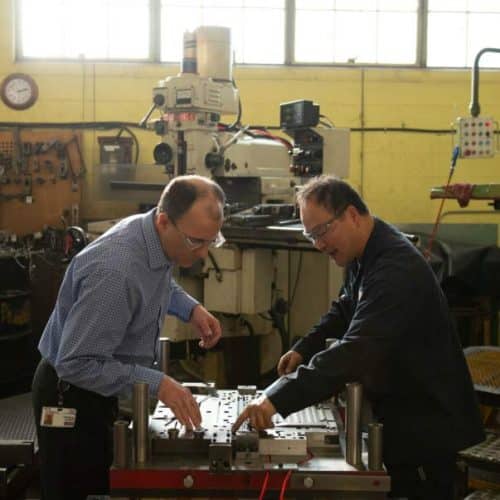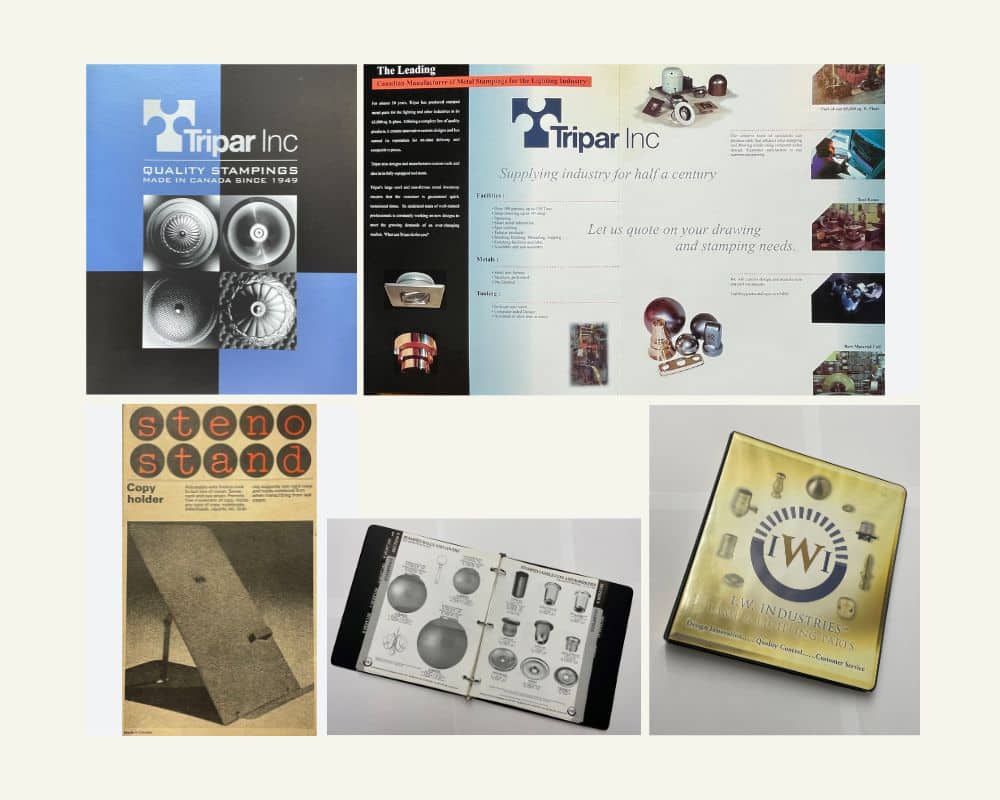Dealing with the wrong supplier is a costly and frustrating experience for any OEM!
Poor quality parts. Late deliveries. Cost overruns. Price disputes. Loss of trust. Loss of sales.
That’s why selecting the right supplier should NEVER be taken lightly.
And if your supplier also delivers non-conforming parts or is late, price is quickly forgotten and your net price is increased given the problems caused by the failures, customer disappointments, late deliveries, and the loss of customers!
Don’t just look at price when you deal with suppliers! Look at reliability and value.
Finding the right strategic partner is key to ensuring a smooth painless production and delivery to your facility every time. That is normal when you deal with the right supplier. Things run like a well-oiled machine.

"The bitterness of poor quality remains long after the sweetness of low price is forgotten."
Benjamin Franklin
What to look for in a metal fabricator or stamping company
- Quality: What standards are being followed?
- Delivery: What is their historical performance amongst existing customers?
- Customer Service: How is their customer service, and how responsive are they?
- Engineering: What technical support is provided?
- Processes: What metal fabrication and/or metal stamping processes do they have?
- Marketing: Does their marketing stand up to scrutiny?
- Location: Where are they, and are parts produced at this same location?
- Customers: Who are they?
- Tooling: Where is tooling designed, built, and maintained?
- Culture: What are their underlying values?
- Sustainability: What practices are employed to help protect our planet?
- Safety: What priorities and practices are in place to protect worker safety?
- Price: What's the cost me? Do I trust that they can fulfill my needs reliably?
Going deeper still
The above factors are discussed below in no particular order. Rather, it is up to you to prioritize those which you feel are most important in evaluating and selecting your supplier of metal fabricated & stamped parts.
Quality: Find out if/what quality standards the supplier is certified to, e.g., ISO9001, or adhering to, e.g. CSA Standard CAN3-Z299.4-85. Ask what other systems they have in place, their defect rates, how they deal with non-conforming raw material, WIP, and final products. Better yet, visit their facility, to see if what they claim is really happening!
Delivery: Ask what their lead times are, and how this compares with their historical delivery performance. Ask for reports to back up any claims.
Customer Service: How communicative and timely is the supplier’s Customer Service, from order acknowledgments and replies to inquiries, to shipping information? What is their shipping policy, e.g., do they offer prepaid & charge terms of service? Do they truly look out for you, their customer? Examples include notifying you ahead of time should there be any issue with your order, or keeping tabs of your orders/ trends; reaching out to you if these indicate that you could potentially run out of stock. The bottom line is; in today’s demanding and fast paced world, how easy are they to deal with?!
Engineering: Is any engineering support provided?
This could be any of the following; review of tolerances, drawing/model support/assistance, and tool design. Please see also Design for Manufacturability (DFM), Part 1.
DFM is not necessarily limited to a supplier offering suggestions to make the part more manufacturable, but also to;
– Reduce cost = reduced price to you!
– Suggest modifications to take advantage of any existing tooling the supplier may have! Please see also Design for Manufacturability (DFM), Part 2.
Processes: A metal fabricator typically uses flexible CNC sheet metal equipment such as CNC punch presses, lasers, and press breaks which usually require more labor but little to no tooling, thus are best suited for low-mid volumes.
A metal stamper typically uses punch presses, which require less labor, but hard tooling, typically dies, thus are best suited for mid-high volumes. Please see also Metal Fabrication vs Metal Stamping for Sheet Metal Components.
A case for hybrid manufacturing
For every 100 metal fabricators, there are approximately 15 metal stampers, and perhaps only 5 that do both (“hybrid manufacturing”). The last being the most advantageous. Why? Because a manufacturer that has both will look at your part’s complexities, lot qty(s), and your EAUs, and quote based on the process(es) that work to your best advantage.
Besides being the right and honest thing to do, this is also the smartest way to operate; if that supplier solves your problem for the lowest possible cost, they have a much greater likelihood of having you as their loyal customer… for life! Please see also Hybrid Manufacturing, Options to Metal Fabrication vs Metal Stamping.
Marketing: Look at the manufacturer’s website, then challenge them on anything you doubt, they claim, or to address and answer your questions. Look for independent articles or reviews of them, as well as any awards they may have received. Challenge them to back up any claims!
Location: With supply change challenges, be it from a pandemic, to rising fuel/transport costs, to lead time, ask where are their parts produced? How far is this from you?
If produced in another country, do they have export experience? Are there any import duties?
Local manufacturers have a huge speed advantage. You don’t have to wait 3 or 4 months (or more) to get your parts from China, to later realize that there are quality issues with it.
Please see also The United States-Mexico-Canada Agreement (USMCA) Impacts Canadian Metal Stamping and CNC Fabricators.
Customers: Ask what markets they serve. Do any align with yours? If so, what are the advantages of working with a supplier who has expertise in your market? Have they offered any customer testimonials? If not, can they provide the contact information of some?
Tooling: Die design, manufacture, maintenance & repair are all critical not only to offer maximum competitiveness, but to also ensure that a customer’s supply is free from defects and the supply chain is reliable.
Does the supplier do their own die design? Do they have an in-house toolroom to support all related activities? Do they prioritize maintenance and repairs to ensure uninterrupted and reliable delivery?
Please see also The Benefits Of Having A In-House Toolroom.
Culture: What are their values? Do they align with your own? These can be anything from workplace safety and environmental sensitivity, to employee apprenticeships, training & advancement opportunities.
Sustainability: What environmentally sound practices does the supplier prescribe to? Do their processes create any effluent? If so, how are these recycled or disposed of? Do they recycle wherever possible? What measures have they put in place to reduce energy consumption?
Safety: What priority and practices does the supplier have with respect to worker safety? Is there a safety committee? Does it meet regularly? How often? Are action items documented? Do they meet or exceed all required OSHA or other imposed safety regulations? What is their accident rate or history? Please see also The Importance Of Safety In The Metal Fabrication Industry In 2022.
If it wasn’t already evident, choosing (or switching) your supplier(s) of metal fabricated or stamped parts should be about much more than price and even quality. Challenge them on all the above points before taking the plunge or making a switch!




